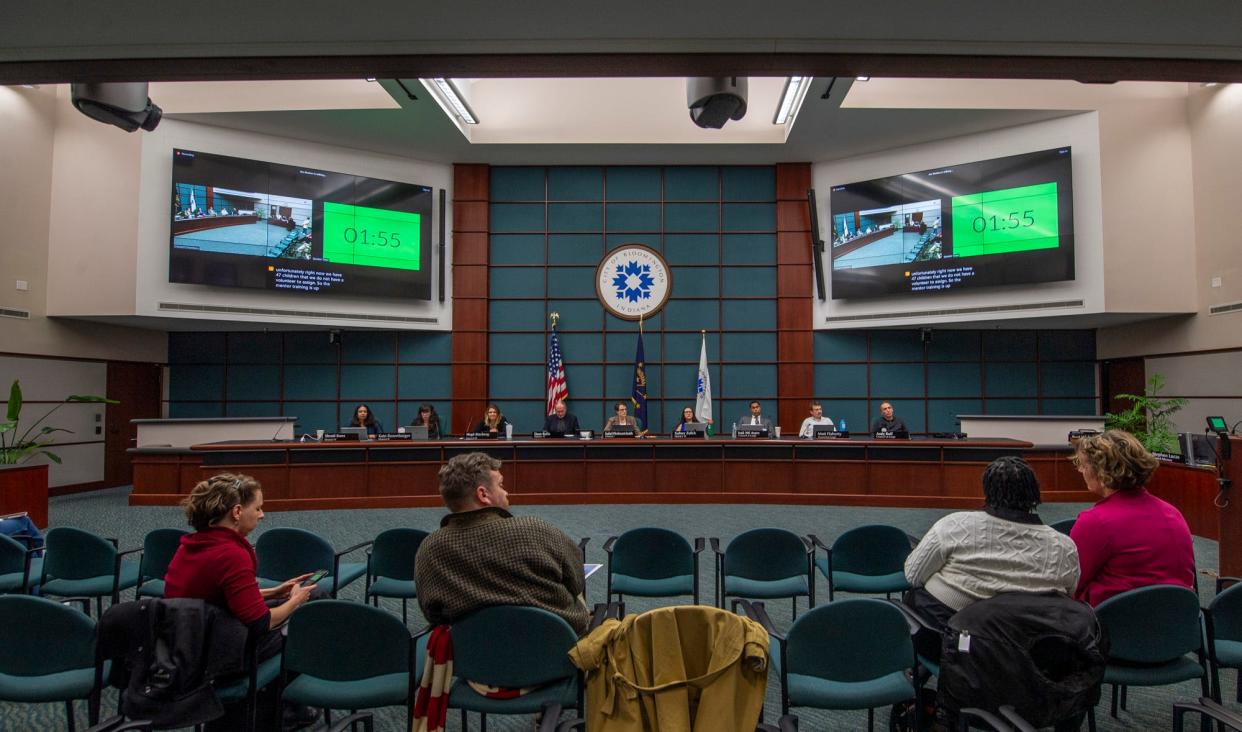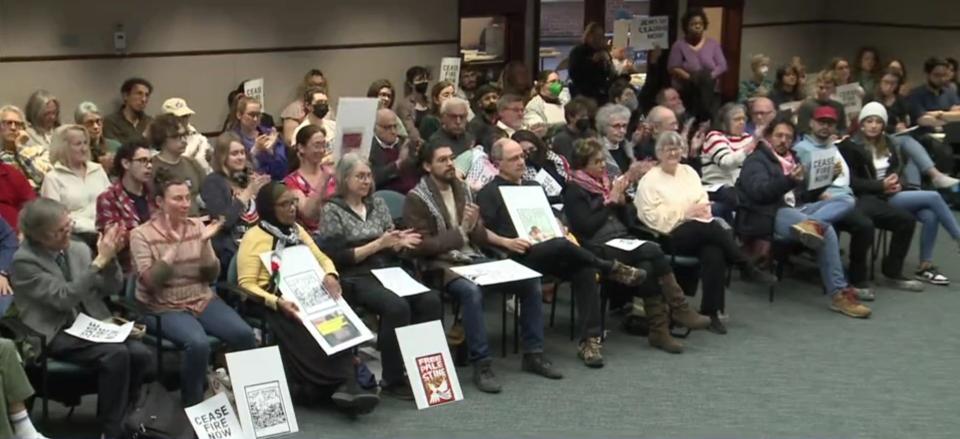Bloomington city council to weigh resolution on Gaza; mayor says she will veto

The Bloomington City Council on Wednesday will consider adopting an Israel-Hamas war-related resolution — though Mayor Kerry Thomson said if it passes, she will exercise her veto powers.
The resolution calls for “a cessation of hostilities and delivery of humanitarian aid to civilians in Gaza" and was sponsored by council President Isabel Piedmont-Smith and member Dave Rollo.
The resolution reads, in part, that the council condemns “all forms of antisemitism, Islamophobia, racism and bigotry,” and urges national leaders to work toward a cessation of hostilities, a ceasefire, financial support for humanitarian aid, the release of all hostages and “a lasting, peaceful solution to the conflict.”
Bloomington council hears weeks of public comment
For weeks, the council’s public comment periods have been dominated by local residents urging the council to pass such a resolution, though neither the support for the resolution nor what should be concluded has been unanimous.
The Israel-Hamas conflict also has embroiled the Indiana University campus, with the university's leadership facing backlash over its decision to cancel an exhibition of IU alumna Samia Halaby. Faculty, students and free speech advocates accused the university's leadership of censoring Halaby for her pro-Palestinian viewpoints.
In November, U.S. Rep. Jim Banks, R-Ind., asked IU President Pamela Whitten to “aggressively respond to reports of antisemitism” and to answer six questions related to antisemitism on IU’s campus. Some faculty penned a letter in response, saying Banks was attempting to stifle academic freedom and free speech.
IU profs: Jim Banks' letter alleging antisemitism on campus aims at 'heart of democracy'
Last week’s city council meeting took nearly six hours and included almost an hour of public comment, with all but three of more than 30 speakers addressing a ceasefire resolution, though it had not been crafted yet. Residents also flocked to council meetings on March 6 and Feb. 28 to speak about a possible resolution.
Speakers included Indiana University students, retired IU professors, long-time residents, newcomers and people of various faiths. Most called for the council to adopt a resolution, including Daniel Segal, a Jewish American and retired history professor, whose voice broke when he recalled growing up in a Jewish community that included members who had on their arms tattoos that were forced on them in the Nazi death camp Auschwitz.
Many residents supported a resolution calling for a ceasefire, there was some disagreement about the wording. Some advocated for such a resolution to include acknowledgement of Hamas’ responsibility and/or require the group’s disarmament. Others pushed back, however, saying the Oct. 7 attack by Hamas did not happen in a vacuum, but was a response to decades of occupation.
While most speakers supported some kind of resolution, a few also questioned whether a conflict thousands of miles away warrants council and resident time and resources.
For example, Noah Stoffman, an IU professor, said while his heart breaks for the affected people, he urged the council to use its time on things it can actually change.
He also told council members he appreciated their removing from the resolution some of the more inflammatory language.
“I’m fortunate enough to own a dictionary and therefore … I know that claims that Israel is an apartheid state and that genocide is occurring are unfounded,” Stoffman said.
The comments elicited other audience members to voice their displeasure, which drew an admonishment from Piedmont-Smith.
“Quiet. Quiet,” she said. “If you cannot respect other people’s turn at the mic, then I would ask you to please leave.”
A few minutes later, an IU student pushed back against Stoffman’s comments, saying, “You need more than a dictionary to see if it’s an apartheid (state.)”
Bloomington tradition? Resolutions have been passed before
Council Vice President Andy Ruff said at the beginning of the meeting that adopting such resolutions was part of Bloomington tradition.
“To me, and to a lot of people in our town, these kinds of resolutions are one of the many things that make Bloomington, Bloomington,” he said. “It’s one way of thinking globally and acting locally.”
The statements were met by applause from the capacity crowd in council chambers.

The council has, throughout the decades, crafted resolutions regarding issues including the Iraq War and nuclear proliferation. In a city council meeting on Feb. 28, Charlotte Zietlow urged council members to pass a ceasefire resolution, recalling how the council decades ago passed a resolution to stop the Vietnam War.
However, Bloomington Mayor Kerry Thomson said she would not sign resolutions “that do not directly impact the business of our city.”
Thomson said she appreciated the public engagement — one of the commenters that day was her husband, IU physics professor Babak Seradjeh — but she said the public engagement did not demand council action.
"While ... we do have public comment period every night during city council meetings for residents to express their views … I also don’t believe that we need an official resolution for the council to express its opinion," Thomson said.
The mayor's office said via email this week that while Thomson "appreciates that resolutions have been used in the past to signal opinions on federal and international matters, it is always a valuable exercise to return to core principles and duties.
"Mayor Thomson ran for mayor because she believes we can improve government, and with that commitment comes a promise to examine what we do, even (perhaps especially) if we have seemingly always done it that way.
"We have a great body of work in front of us as city leaders, and our ability to impact decisions outside of our realm of direct influence is limited. Mayor Thomson is committed to focusing on the issues here in Bloomington, and these resolutions can and do take up considerable work time — time she chooses to spend on direct service to Bloomington."
“As a matter of principle," Thomson said last week, "I will not be signing any resolutions that do not directly impact the business of our city."
Segal, the retired history professor, had said in February that in situations such as this, the city should do everything it can, including passing resolutions.
"My parents … raised me to know that when genocide is unfolding you don’t continue with business as usual," Segal said.
The council could override the mayor's veto with six votes.
You can read the full resolution on page 36 of this document: tinyurl.com/yuzcccxb.
The council will discuss the matter Wednesday. The meeting is set to begin at 6:30 p.m.
The agenda also includes legislation related to the city's zoning code and resolutions to:
Authorize the 2024 outdoor dining program in the downtown corridor
Establish the goal of reducing traffic deaths and serious injuries on the city’s roadways to zero by 2039.
Boris Ladwig can be reached at bladwig@heraldt.com.
This article originally appeared on The Herald-Times: Bloomington council to weigh Gaza ceasefire, Thompson plans veto

